新概念英语第二册主谓一致期末复习课件(共26张PPT)
文档属性
| 名称 | 新概念英语第二册主谓一致期末复习课件(共26张PPT) | 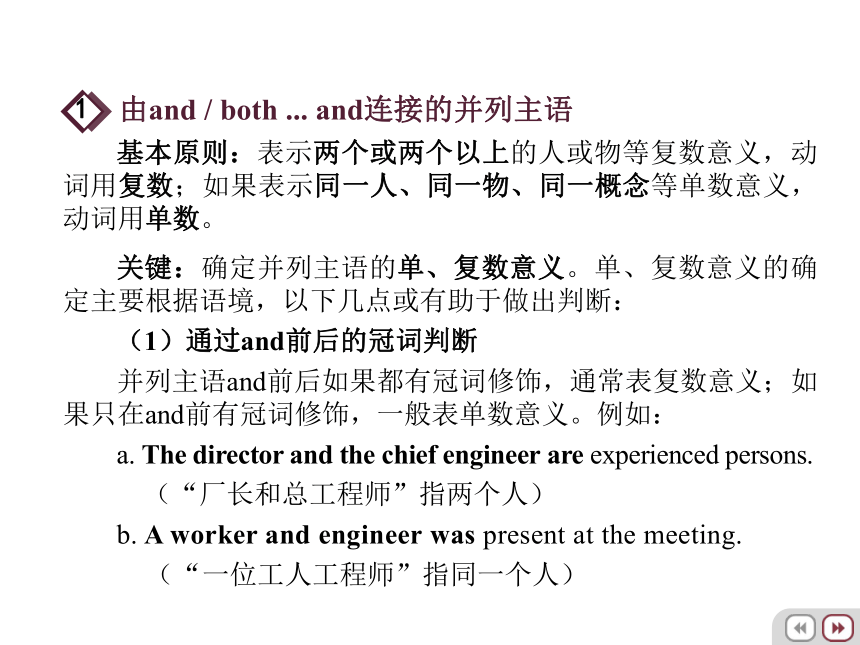 | |
| 格式 | pptx | ||
| 文件大小 | 848.9KB | ||
| 资源类型 | 教案 | ||
| 版本资源 | 新概念英语 | ||
| 科目 | 英语 | ||
| 更新时间 | 2024-11-25 18:35:36 | ||
图片预览

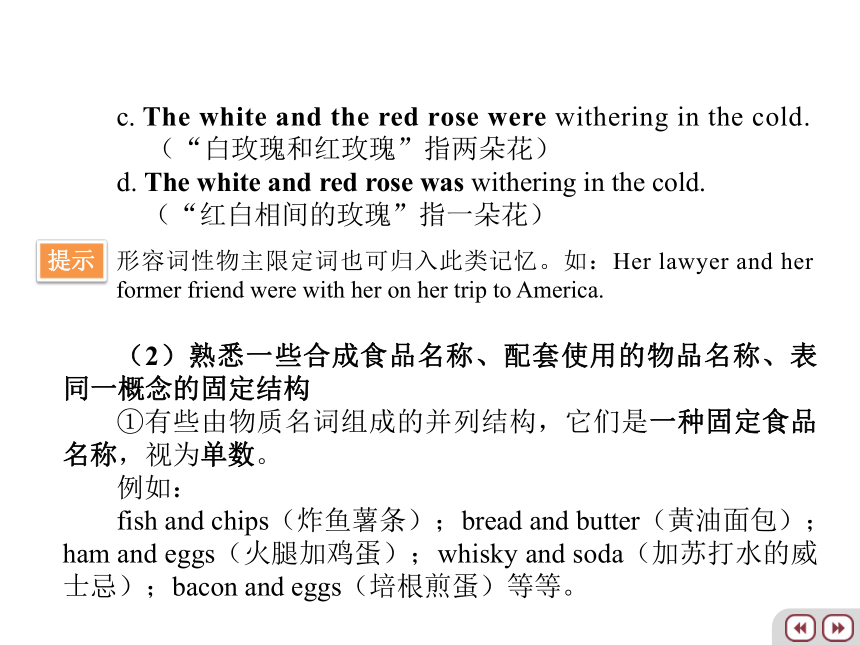

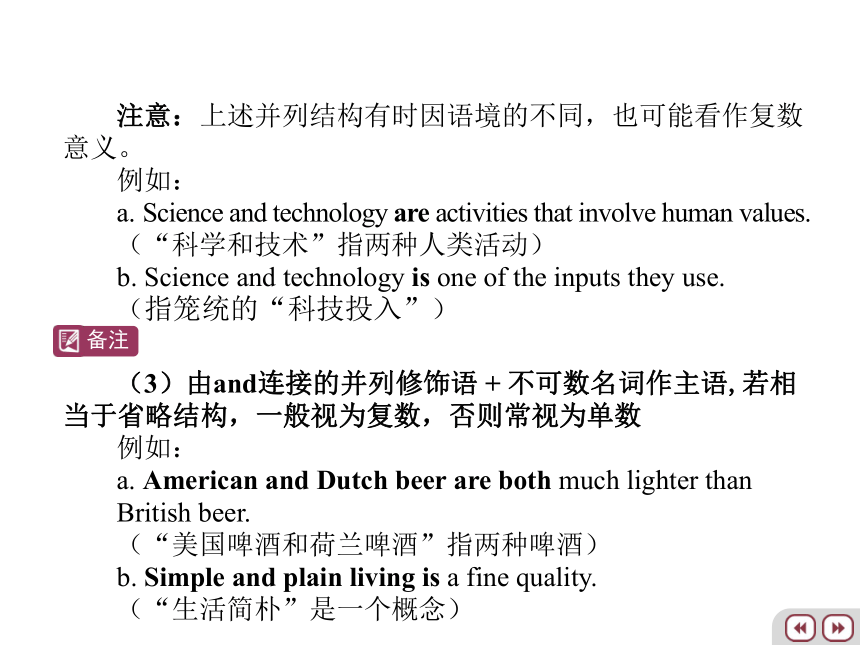
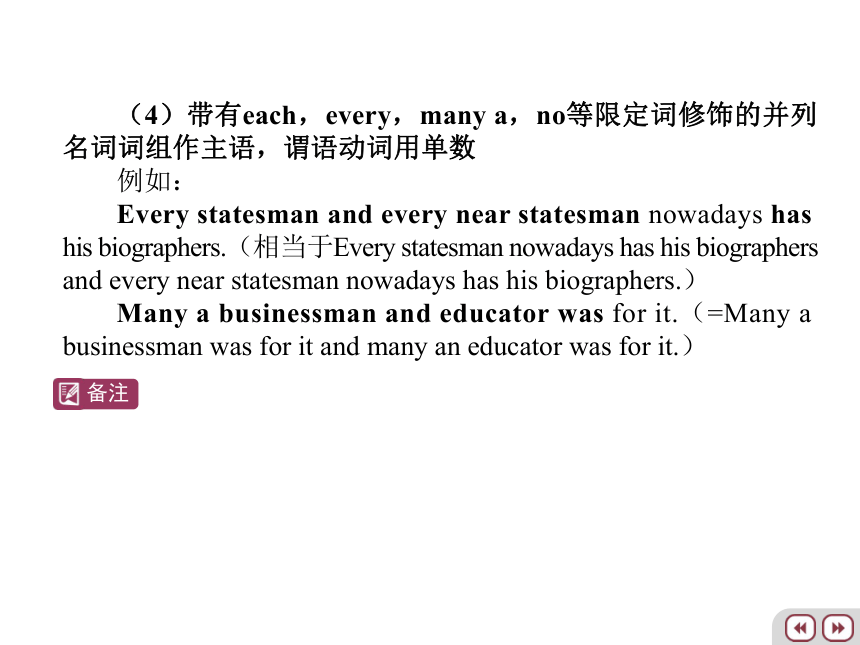
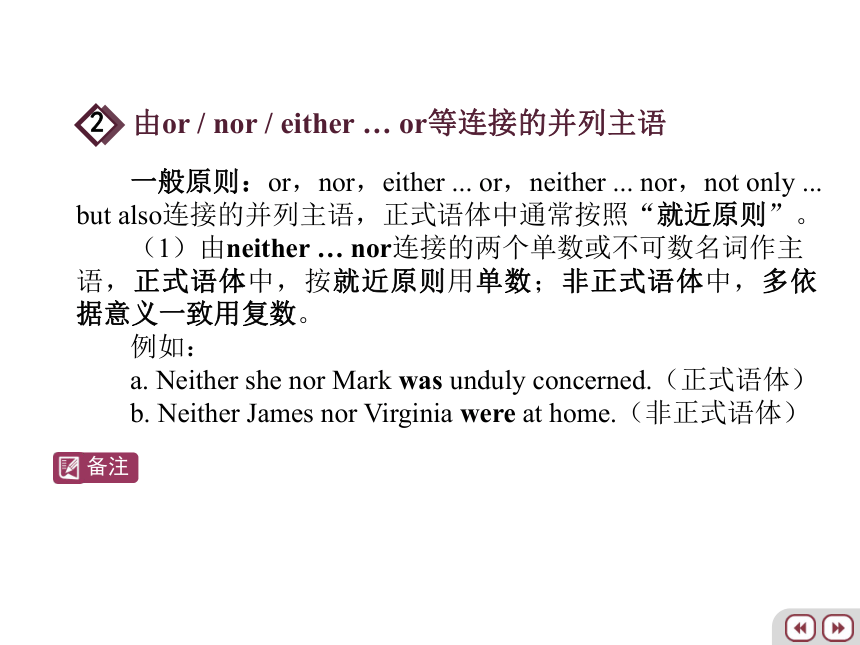


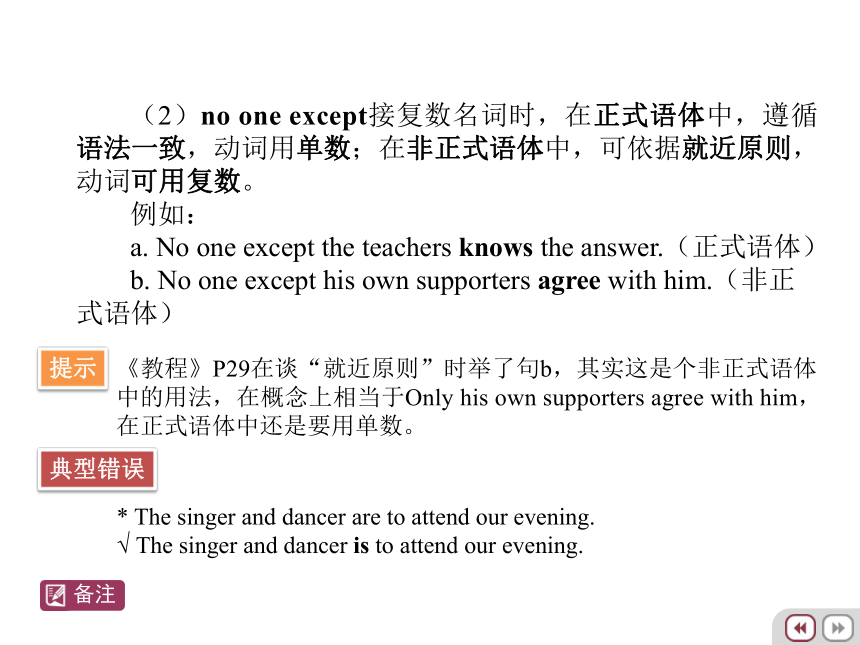
文档简介
(共26张PPT)
基本原则:表示两个或两个以上的人或物等复数意义,动词用复数;如果表示同一人、同一物、同一概念等单数意义,动词用单数。
关键:确定并列主语的单、复数意义。单、复数意义的确定主要根据语境,以下几点或有助于做出判断:
(1)通过and前后的冠词判断
并列主语and前后如果都有冠词修饰,通常表复数意义;如果只在and前有冠词修饰,一般表单数意义。例如:
a. The director and the chief engineer are experienced persons.
(“厂长和总工程师”指两个人)
b. A worker and engineer was present at the meeting.
(“一位工人工程师”指同一个人)
由and / both ... and连接的并列主语
1
c. The white and the red rose were withering in the cold.
(“白玫瑰和红玫瑰”指两朵花)
d. The white and red rose was withering in the cold.
(“红白相间的玫瑰”指一朵花)
(2)熟悉一些合成食品名称、配套使用的物品名称、表同一概念的固定结构
①有些由物质名词组成的并列结构,它们是一种固定食品名称,视为单数。
例如:
fish and chips(炸鱼薯条);bread and butter(黄油面包);ham and eggs(火腿加鸡蛋);whisky and soda(加苏打水的威士忌);bacon and eggs(培根煎蛋)等等。
形容词性物主限定词也可归入此类记忆。如:Her lawyer and her former friend were with her on her trip to America.
提示
②有些由两个物件组成的物品,配套使用,也可视为单数意义。
例如:
a knife and fork(一副刀叉);a bow and arrow(一副弓箭);a cup and saucer(一套杯碟);a cart and horse(一架马车);a needle and thread(针线);the wheel and axle(轮轴);the hammer and sickle(铁锤镰刀旗);the Stars and Stripes(星条旗)等等。
③还有些并列结构,固定在一起使用,通常表达一个概念,也视为单数意义。
例如:
law and order(法律与秩序);war and peace(战争与和平);trial and error(试错法,反复尝试);iron and steel(钢铁);blood and iron(铁血政策);science and technology(科学技术);sum and substance(实质);truth and honesty(真诚);wit and humor(机智与幽默);all work and no play(只工作不玩耍);early to bed and early to rise(早睡早起)等等。
注意:上述并列结构有时因语境的不同,也可能看作复数意义。
例如:
a. Science and technology are activities that involve human values.
(“科学和技术”指两种人类活动)
b. Science and technology is one of the inputs they use.
(指笼统的“科技投入”)
(3)由and连接的并列修饰语 + 不可数名词作主语,若相当于省略结构,一般视为复数,否则常视为单数
例如:
a. American and Dutch beer are both much lighter than
British beer.
(“美国啤酒和荷兰啤酒”指两种啤酒)
b. Simple and plain living is a fine quality.
(“生活简朴”是一个概念)
备注
(4)带有each,every,many a,no等限定词修饰的并列名词词组作主语,谓语动词用单数
例如:
Every statesman and every near statesman nowadays has his biographers.(相当于Every statesman nowadays has his biographers and every near statesman nowadays has his biographers.)
Many a businessman and educator was for it.(=Many a businessman was for it and many an educator was for it.)
备注
一般原则:or,nor,either ... or,neither ... nor,not only ... but also连接的并列主语,正式语体中通常按照“就近原则”。
(1)由neither … nor连接的两个单数或不可数名词作主
语,正式语体中,按就近原则用单数;非正式语体中,多依据意义一致用复数。
例如:
a. Neither she nor Mark was unduly concerned.(正式语体)
b. Neither James nor Virginia were at home.(非正式语体)
由or / nor / either … or等连接的并列主语
2
备注
(2)由either ... or连接的两个单数或不可数名词作主语,正式语体中,遵循就近原则,动词用单数;在非正式语体中,动词间或可以用复数。
例如:
a. If either David or Janet comes, he or she will want a drink.
(正式语体)
b. If either David or Janet come, they will want a drink.
(非正式语体)
either ... or这种非正式语体的用法并不像neither ... nor用复数那样常见。
提示
(1)主语 + as much as, rather than, like, no less than等连接词或主语 + as well as, along with, except, instead of等介词词组时,其谓语动词形式取决于主语本身。
例如:
His brother rather than his parents is to blame.(相当于His
brother is to blame rather than his parents.)
John, along with his parents, has moved to London.(相当于
John has moved to London along with his parents.)
主语 + as much as等,主语 + as well as等
3
可以理解为把这些修饰成分后置,而句意保持不变。
提示
(2)no one except接复数名词时,在正式语体中,遵循语法一致,动词用单数;在非正式语体中,可依据就近原则,动词可用复数。
例如:
a. No one except the teachers knows the answer.(正式语体)
b. No one except his own supporters agree with him.(非正式语体)
《教程》P29在谈“就近原则”时举了句b,其实这是个非正式语体中的用法,在概念上相当于Only his own supporters agree with him,在正式语体中还是要用单数。
提示
典型错误
* The singer and dancer are to attend our evening.
√ The singer and dancer is to attend our evening.
备注
常遵循意义一致,即若看作整体,动词用单数,若强调个体,动词用复数。
比较:
① Fifty miles is a long way for a young child to go alone.
② Those last two miles were the longest I’ve ever had to run!
当主语为表示时间、距离、价值、度量等名词复数时
1
(1)“all of / lots of等 + 名词”作主语,动词形式依of-词组中的名词类别确定
“all of / lots of 等 + 名词”作主语与“a portion / series
of等 + 名词”作主语比较
2
到底看成整体还是强调个体需通过语境信息判断。
提示
备注
Half of the students in our school are girls.
Lots of food is going to waste.
(2)“a portion / series / pile / panel / committee of + 名词”作主语,动词通常用单数
A series of questions was developed to guide in this process.
There was a pile of bricks in one of the courtyards.
of-结构在整个名词词组中作后置修饰语,of后的名词决定了all,lots等不定代词的所指意义,即主语的单、复数意义是由of后的名词类别所决定的。
提示
这类词组不论是“一部分;一系列”,还是“一堆;一组”等,都是强调“同质性”,因此可以视为单数概念,这里“a”是关键。
提示
意义虽为复数,动词用单数
Many a good man has been destroyed by drink. (=Many good men have been destroyed by drink.)
There is more than one pronunciation of “garage”.
“many a + 名词”/ “more than one + 名词”作主语
3
many a(好些,许多)结构属于比较文气或强调的说法。
提示
典型错误
* ① Forty years have passed since Tangshan was hit by earthquake.
* ② A pile of letters were lying on the floor.
√ Forty years has passed since Tangshan was hit by earthquake.
√ A pile of letters was lying on the floor.
备注
“one of + 复数名词 + 关系分句”中的主谓一致问题
(1)按照传统语法,通常根据语法一致的原则用复数;当one前面有定冠词the,the only,any等限定词和强调语,则根据意义一致原则用单数。
例如:
He was one of those people who are instantly popular.
Stone is the only one of the three who is married and has a child.
(2)在实际使用中,这条规则没有被很好地遵守,有时one前面并没有the only等限定词和强调语,关系分句中的谓语动词也用单数形式,这种情况在英国英语中并不少见。
例如:
The Cutty Sark was one of the fastest sailing ships that has
ever been built.
作为英语学习者,我们在使用时还是应该遵循这条传统规则,并了解语言在实际使用中的情况。
提示
I’m one of those people who thinks heaven would be boring.
Which of the following statements is INCORRECT ______
A.
B.
C.
D.
Only one out of six were present at the meeting.
Ten dollars was stolen from the cash register.
Either my sister or my brother is coming.
Five miles seem like a long walk to me.
本题考查主谓一致三原则。A句为one out of + 复数名词作主语,在正式语体中,动词用单数,在非正式语体中,动词可按“就近原则”用复数;B句主语为确定数量的名词词组ten dollars,强调整体,动词用单数;C句为either … or结构,一般依据“就近原则”,该句谓语动词用单数,A、B、C三句均语法正确。D项主语five miles为表距离的确定数量的名词词组作主语,但意义上强调整体,看作单数,谓语动词应该用单数,因此D是不正确的表达。
下列哪个陈述不正确?
Which of the following sentences is INCORRECT
A.
B.
C.
D.
Poultry are very expensive in the city.
New machinery were introduced in the factory.
The police are investigating the murder case.
The militia were called out to rescue flood victims.
该题考查主谓一致。machinery为通常作不可数名词的集体名词,随后的动词用单数。因此B为正确答案。poultry,police,militia(民兵)均为通常作复数的集体名词。
下面哪句话不正确?
Mr Wells, together with all the members of his family, ____ for Europe this afternoon.
A.
B.
C.
D.
are to leave
are leaving
is leaving
leave
本题考查主谓一致及现在进行体表示将来的用法。主语后面跟有together with引导的词组时,其后的动词形式取决于主语本身的单、复数。句中together with all the members of his family从结构上属于插入成分,句子的真正主语只是Mr Wells,故选C。
今天下午威尔斯先生将同他的全家一起前往欧洲。
It is futile to discuss the matter further, because ____ going to agree upon anything today.
A.
B.
C.
D.
neither you nor I are
neither you nor me is
neither you nor I am
neither me nor you are
该题考查的是主谓一致中的“就近原则”。由neither … nor连接的并列结构作主语,随后的动词按“就近原则”,即与nor后主语的人称和数保持一致,因此C为正确答案。 B、D中宾格me不能作主语。
这个问题再进一步讨论下去是没有用的,因为无论你还是我今天都不会在任何事情上达成一致。
本讲主要介绍了以并列结构作主语的主谓一致问题,以表示数量概念的名词词组作主语的主谓一致问题,以及以名词性分句作主语等其他方面的主谓一致问题。学习中可以将主谓一致三原则在上述内容中的适用情况作为主线,其中意义一致的原则适用于大多数情况,如由and / both ... and连接的并列主语,以表示数量概念的名词词组作主语的多数情形,以名词性分句、非限定分句做主语,甚至其中看似比较特殊的“a portion / series等+名词”作主语都可以通过意义一致原则得到解释;语法一致的原则适用于“主语 + as much as / as well as”等结构,“many a +名词 / more than one +名词”,关系分句、分裂句中的主谓一致问题;就近原则适用于由or / nor / either … or等连接的并列主语,存在句中的主谓一致问题。另外,注意在不同语体中语言形式的实际使用。
Each man and each woman there (is, are) asked to help.
Law and order (means, mean) different things to people with different political opinions.
Fish and chips (is, are) getting very expensive.
War and peace (is, are) alternatives between which men must constantly choose.
American and Dutch beer (is, are) both much lighter than British.
1.0
2.0
3.0
4.
5.
His friend and fellow author (was, were) cool to the idea of collaborating on a cookbook.
Neither sleet nor snow (stops, stop) him from driving his new Mercedes-Benz.
Weeping and wailing (does, do) nothing towards solving the problem.
Hugh, as well as his two sisters, (is, are) vacationing in Wyoming this summer.
Many a boy (was, were) disappointed after seeing the film.
6.
7.
8.
9.
10.
Where (’s, ’re) that five pounds I lent you
Two more dollars (is, are) missing from the till this morning.
A number of pages (is, are) badly torn.
Three pints (is, are) not enough to get him drunk.
There (is, are) more than one answer to your question.
Only 25 per cent of the capital (is, are) American-owned.
1.0
2.0
3.0
4.
5.
6.
Few of my family really (understands, understand) me.
Many a person in these circumstances (has, have) hoped for a long break.
Every man, woman, and child (was, were) asked to contribute.
The British (is, are) very proud of their sense of humour.
Lots of the stuff (is, are) going to waste.
A substantial portion of reports (is, are) missing.
7.
8.
9.
10.
11.
12.
Five times seven (is, are) thirty-five.
Thirty people in my class are Arabs and the remainder (is, are) Canadians.
None of the audience (points, point) to his guilt.
There (is, are) one apple and three pears in the refrigerator.
A pile of apple logs (was, were) set beside the hearth.
The deceased (was, were) his mother.
13.
14.
15.
16.
17.
18.
What they want (is, are) some financial aids.
Why he entered the house and how he managed to get out of it without being seen by people (remains, remain) a mystery to us all.
Watering the flowers and looking after the children (is, are) all I have to do every day.
He’s one of those men who never (cares, care) how they look.
It’s me that (am, is) responsible for the organization.
1.0
2.0
3.0
4.
5.
She’s the only one of these women who (plays, play) bridge well.
Attending on-campus concerts (is, are) part of the pleasure of college life.
There (is, are) more than one member who (has, have) protested against the proposal.
6.
7.
8.
基本原则:表示两个或两个以上的人或物等复数意义,动词用复数;如果表示同一人、同一物、同一概念等单数意义,动词用单数。
关键:确定并列主语的单、复数意义。单、复数意义的确定主要根据语境,以下几点或有助于做出判断:
(1)通过and前后的冠词判断
并列主语and前后如果都有冠词修饰,通常表复数意义;如果只在and前有冠词修饰,一般表单数意义。例如:
a. The director and the chief engineer are experienced persons.
(“厂长和总工程师”指两个人)
b. A worker and engineer was present at the meeting.
(“一位工人工程师”指同一个人)
由and / both ... and连接的并列主语
1
c. The white and the red rose were withering in the cold.
(“白玫瑰和红玫瑰”指两朵花)
d. The white and red rose was withering in the cold.
(“红白相间的玫瑰”指一朵花)
(2)熟悉一些合成食品名称、配套使用的物品名称、表同一概念的固定结构
①有些由物质名词组成的并列结构,它们是一种固定食品名称,视为单数。
例如:
fish and chips(炸鱼薯条);bread and butter(黄油面包);ham and eggs(火腿加鸡蛋);whisky and soda(加苏打水的威士忌);bacon and eggs(培根煎蛋)等等。
形容词性物主限定词也可归入此类记忆。如:Her lawyer and her former friend were with her on her trip to America.
提示
②有些由两个物件组成的物品,配套使用,也可视为单数意义。
例如:
a knife and fork(一副刀叉);a bow and arrow(一副弓箭);a cup and saucer(一套杯碟);a cart and horse(一架马车);a needle and thread(针线);the wheel and axle(轮轴);the hammer and sickle(铁锤镰刀旗);the Stars and Stripes(星条旗)等等。
③还有些并列结构,固定在一起使用,通常表达一个概念,也视为单数意义。
例如:
law and order(法律与秩序);war and peace(战争与和平);trial and error(试错法,反复尝试);iron and steel(钢铁);blood and iron(铁血政策);science and technology(科学技术);sum and substance(实质);truth and honesty(真诚);wit and humor(机智与幽默);all work and no play(只工作不玩耍);early to bed and early to rise(早睡早起)等等。
注意:上述并列结构有时因语境的不同,也可能看作复数意义。
例如:
a. Science and technology are activities that involve human values.
(“科学和技术”指两种人类活动)
b. Science and technology is one of the inputs they use.
(指笼统的“科技投入”)
(3)由and连接的并列修饰语 + 不可数名词作主语,若相当于省略结构,一般视为复数,否则常视为单数
例如:
a. American and Dutch beer are both much lighter than
British beer.
(“美国啤酒和荷兰啤酒”指两种啤酒)
b. Simple and plain living is a fine quality.
(“生活简朴”是一个概念)
备注
(4)带有each,every,many a,no等限定词修饰的并列名词词组作主语,谓语动词用单数
例如:
Every statesman and every near statesman nowadays has his biographers.(相当于Every statesman nowadays has his biographers and every near statesman nowadays has his biographers.)
Many a businessman and educator was for it.(=Many a businessman was for it and many an educator was for it.)
备注
一般原则:or,nor,either ... or,neither ... nor,not only ... but also连接的并列主语,正式语体中通常按照“就近原则”。
(1)由neither … nor连接的两个单数或不可数名词作主
语,正式语体中,按就近原则用单数;非正式语体中,多依据意义一致用复数。
例如:
a. Neither she nor Mark was unduly concerned.(正式语体)
b. Neither James nor Virginia were at home.(非正式语体)
由or / nor / either … or等连接的并列主语
2
备注
(2)由either ... or连接的两个单数或不可数名词作主语,正式语体中,遵循就近原则,动词用单数;在非正式语体中,动词间或可以用复数。
例如:
a. If either David or Janet comes, he or she will want a drink.
(正式语体)
b. If either David or Janet come, they will want a drink.
(非正式语体)
either ... or这种非正式语体的用法并不像neither ... nor用复数那样常见。
提示
(1)主语 + as much as, rather than, like, no less than等连接词或主语 + as well as, along with, except, instead of等介词词组时,其谓语动词形式取决于主语本身。
例如:
His brother rather than his parents is to blame.(相当于His
brother is to blame rather than his parents.)
John, along with his parents, has moved to London.(相当于
John has moved to London along with his parents.)
主语 + as much as等,主语 + as well as等
3
可以理解为把这些修饰成分后置,而句意保持不变。
提示
(2)no one except接复数名词时,在正式语体中,遵循语法一致,动词用单数;在非正式语体中,可依据就近原则,动词可用复数。
例如:
a. No one except the teachers knows the answer.(正式语体)
b. No one except his own supporters agree with him.(非正式语体)
《教程》P29在谈“就近原则”时举了句b,其实这是个非正式语体中的用法,在概念上相当于Only his own supporters agree with him,在正式语体中还是要用单数。
提示
典型错误
* The singer and dancer are to attend our evening.
√ The singer and dancer is to attend our evening.
备注
常遵循意义一致,即若看作整体,动词用单数,若强调个体,动词用复数。
比较:
① Fifty miles is a long way for a young child to go alone.
② Those last two miles were the longest I’ve ever had to run!
当主语为表示时间、距离、价值、度量等名词复数时
1
(1)“all of / lots of等 + 名词”作主语,动词形式依of-词组中的名词类别确定
“all of / lots of 等 + 名词”作主语与“a portion / series
of等 + 名词”作主语比较
2
到底看成整体还是强调个体需通过语境信息判断。
提示
备注
Half of the students in our school are girls.
Lots of food is going to waste.
(2)“a portion / series / pile / panel / committee of + 名词”作主语,动词通常用单数
A series of questions was developed to guide in this process.
There was a pile of bricks in one of the courtyards.
of-结构在整个名词词组中作后置修饰语,of后的名词决定了all,lots等不定代词的所指意义,即主语的单、复数意义是由of后的名词类别所决定的。
提示
这类词组不论是“一部分;一系列”,还是“一堆;一组”等,都是强调“同质性”,因此可以视为单数概念,这里“a”是关键。
提示
意义虽为复数,动词用单数
Many a good man has been destroyed by drink. (=Many good men have been destroyed by drink.)
There is more than one pronunciation of “garage”.
“many a + 名词”/ “more than one + 名词”作主语
3
many a(好些,许多)结构属于比较文气或强调的说法。
提示
典型错误
* ① Forty years have passed since Tangshan was hit by earthquake.
* ② A pile of letters were lying on the floor.
√ Forty years has passed since Tangshan was hit by earthquake.
√ A pile of letters was lying on the floor.
备注
“one of + 复数名词 + 关系分句”中的主谓一致问题
(1)按照传统语法,通常根据语法一致的原则用复数;当one前面有定冠词the,the only,any等限定词和强调语,则根据意义一致原则用单数。
例如:
He was one of those people who are instantly popular.
Stone is the only one of the three who is married and has a child.
(2)在实际使用中,这条规则没有被很好地遵守,有时one前面并没有the only等限定词和强调语,关系分句中的谓语动词也用单数形式,这种情况在英国英语中并不少见。
例如:
The Cutty Sark was one of the fastest sailing ships that has
ever been built.
作为英语学习者,我们在使用时还是应该遵循这条传统规则,并了解语言在实际使用中的情况。
提示
I’m one of those people who thinks heaven would be boring.
Which of the following statements is INCORRECT ______
A.
B.
C.
D.
Only one out of six were present at the meeting.
Ten dollars was stolen from the cash register.
Either my sister or my brother is coming.
Five miles seem like a long walk to me.
本题考查主谓一致三原则。A句为one out of + 复数名词作主语,在正式语体中,动词用单数,在非正式语体中,动词可按“就近原则”用复数;B句主语为确定数量的名词词组ten dollars,强调整体,动词用单数;C句为either … or结构,一般依据“就近原则”,该句谓语动词用单数,A、B、C三句均语法正确。D项主语five miles为表距离的确定数量的名词词组作主语,但意义上强调整体,看作单数,谓语动词应该用单数,因此D是不正确的表达。
下列哪个陈述不正确?
Which of the following sentences is INCORRECT
A.
B.
C.
D.
Poultry are very expensive in the city.
New machinery were introduced in the factory.
The police are investigating the murder case.
The militia were called out to rescue flood victims.
该题考查主谓一致。machinery为通常作不可数名词的集体名词,随后的动词用单数。因此B为正确答案。poultry,police,militia(民兵)均为通常作复数的集体名词。
下面哪句话不正确?
Mr Wells, together with all the members of his family, ____ for Europe this afternoon.
A.
B.
C.
D.
are to leave
are leaving
is leaving
leave
本题考查主谓一致及现在进行体表示将来的用法。主语后面跟有together with引导的词组时,其后的动词形式取决于主语本身的单、复数。句中together with all the members of his family从结构上属于插入成分,句子的真正主语只是Mr Wells,故选C。
今天下午威尔斯先生将同他的全家一起前往欧洲。
It is futile to discuss the matter further, because ____ going to agree upon anything today.
A.
B.
C.
D.
neither you nor I are
neither you nor me is
neither you nor I am
neither me nor you are
该题考查的是主谓一致中的“就近原则”。由neither … nor连接的并列结构作主语,随后的动词按“就近原则”,即与nor后主语的人称和数保持一致,因此C为正确答案。 B、D中宾格me不能作主语。
这个问题再进一步讨论下去是没有用的,因为无论你还是我今天都不会在任何事情上达成一致。
本讲主要介绍了以并列结构作主语的主谓一致问题,以表示数量概念的名词词组作主语的主谓一致问题,以及以名词性分句作主语等其他方面的主谓一致问题。学习中可以将主谓一致三原则在上述内容中的适用情况作为主线,其中意义一致的原则适用于大多数情况,如由and / both ... and连接的并列主语,以表示数量概念的名词词组作主语的多数情形,以名词性分句、非限定分句做主语,甚至其中看似比较特殊的“a portion / series等+名词”作主语都可以通过意义一致原则得到解释;语法一致的原则适用于“主语 + as much as / as well as”等结构,“many a +名词 / more than one +名词”,关系分句、分裂句中的主谓一致问题;就近原则适用于由or / nor / either … or等连接的并列主语,存在句中的主谓一致问题。另外,注意在不同语体中语言形式的实际使用。
Each man and each woman there (is, are) asked to help.
Law and order (means, mean) different things to people with different political opinions.
Fish and chips (is, are) getting very expensive.
War and peace (is, are) alternatives between which men must constantly choose.
American and Dutch beer (is, are) both much lighter than British.
1.0
2.0
3.0
4.
5.
His friend and fellow author (was, were) cool to the idea of collaborating on a cookbook.
Neither sleet nor snow (stops, stop) him from driving his new Mercedes-Benz.
Weeping and wailing (does, do) nothing towards solving the problem.
Hugh, as well as his two sisters, (is, are) vacationing in Wyoming this summer.
Many a boy (was, were) disappointed after seeing the film.
6.
7.
8.
9.
10.
Where (’s, ’re) that five pounds I lent you
Two more dollars (is, are) missing from the till this morning.
A number of pages (is, are) badly torn.
Three pints (is, are) not enough to get him drunk.
There (is, are) more than one answer to your question.
Only 25 per cent of the capital (is, are) American-owned.
1.0
2.0
3.0
4.
5.
6.
Few of my family really (understands, understand) me.
Many a person in these circumstances (has, have) hoped for a long break.
Every man, woman, and child (was, were) asked to contribute.
The British (is, are) very proud of their sense of humour.
Lots of the stuff (is, are) going to waste.
A substantial portion of reports (is, are) missing.
7.
8.
9.
10.
11.
12.
Five times seven (is, are) thirty-five.
Thirty people in my class are Arabs and the remainder (is, are) Canadians.
None of the audience (points, point) to his guilt.
There (is, are) one apple and three pears in the refrigerator.
A pile of apple logs (was, were) set beside the hearth.
The deceased (was, were) his mother.
13.
14.
15.
16.
17.
18.
What they want (is, are) some financial aids.
Why he entered the house and how he managed to get out of it without being seen by people (remains, remain) a mystery to us all.
Watering the flowers and looking after the children (is, are) all I have to do every day.
He’s one of those men who never (cares, care) how they look.
It’s me that (am, is) responsible for the organization.
1.0
2.0
3.0
4.
5.
She’s the only one of these women who (plays, play) bridge well.
Attending on-campus concerts (is, are) part of the pleasure of college life.
There (is, are) more than one member who (has, have) protested against the proposal.
6.
7.
8.
同课章节目录
